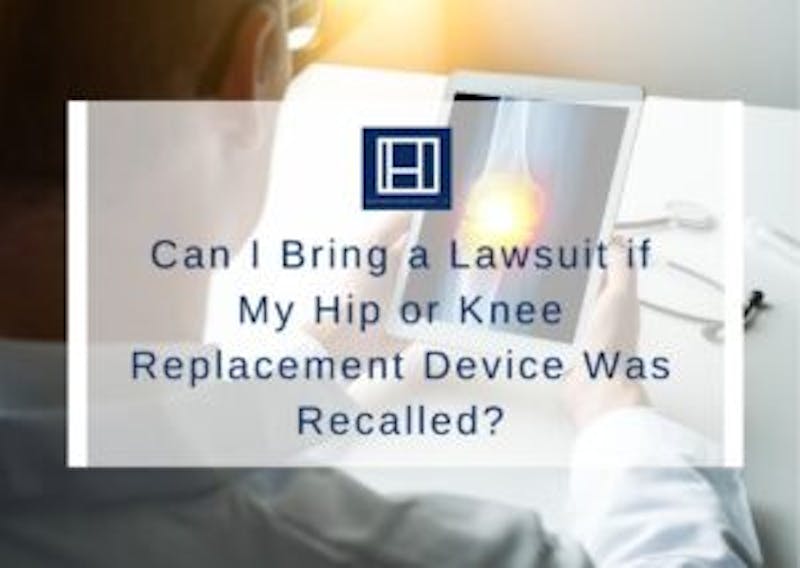
Hundreds of thousands of Americans yearly undergo hip or knee replacement surgeries. Hip or knee replacement surgeries aim to provide patients with more mobility and less pain by replacing damaged joints. Unfortunately, there have been numerous instances in which medical device manufacturers produce defective knee and hip replacement joints. These negligent manufacturers have caused significant pain, medical bills, lost wages, and emotional distress for victims who received defective joints.
When the Federal Drug Administration learns that a specific medical device is defective and causing injuries, they can recall the device. The manufacturer must send out recall notices to patients with defective devices. If you have received a notice that your knee or joint replacement has been recalled, you may be curious as to whether you can pursue compensation through a lawsuit. When the requirements for a product liability lawsuit have been met, you can pursue compensation through a lawsuit.
Proving Liability in a Defective Medical Device Lawsuit
To pursue a product liability lawsuit, you will need to provide evidence that certain elements have been met. First, you will need to show that the product’s manufacturer owed you a duty of care. A duty of care is the obligation held by one party to act toward another party with care and caution. Hip and knee joint manufacturers like Stryker, Smith & Nephew, and Omnilife owe patients who receive their devices a duty to manufacture reasonably safe products.
You will also need to show that the manufacturer breached its duty of care by negligently manufacturing the device. In several defective hip replacement lawsuits, plaintiffs claim that the devices are prone to failing, loosening, or releasing toxic substances into their bodies. Knee replacement device manufacturers have faced similar allegations, specifically allegations that the ceramic coating of their implants prevents proper attachment to the patient’s existing bone, resulting in device loosening and failure. These are examples of negligent product manufacturing.
Additionally, as a plaintiff, you must be able to prove the device manufacturer’s negligence directly caused the injuries or pain you have suffered. In other words, you will need to show that your injuries caused damage. An experienced attorney can help you gather evidence connecting the defective product to your injury, a process that requires a meticulous, skilled attorney.
Schedule a Free Legal Consultation Contact Us
When Can I Sue a Manufacturer for Damages?
If your knee or hip implant has resulted in your injuries, you may be able to damages through a lawsuit, specifically if:
- Your specific medical device has not received a recall yet, but you have been injured due to its failure
- Your device has been recalled, and it is known to cause injury or be faulty
- You do not have a specific injury, but you are experiencing pain, and you suspect that your medical device may be causing your injury
- You have become ill or know that you have been injured due to a defective hip or knee implant
However, you likely do not have a legitimate legal claim in the following circumstances:
You have not been injured, or experienced pain or a loss of function from a hip or knee device that has not been deemed recalled or defective
Your hip or knee injury is unrelated to your orthopedic implant.
Damages Available in Faulty Knee or Hip Replacement Lawsuit
If you are unsure whether you have a valid claim, the best thing you can do is reach out to an experienced attorney. By working with an attorney, you will be able to begin preserving evidence linking the medical device to your claim. An attorney can also begin deposing witnesses and determining the total value of your claim. You only have a limited time to file a product liability lawsuit in Alabama. If you wait too long, you could lose your opportunity to recover the damages you deserve. In Alabama, plaintiffs can pursue damages for all of the following:
- Past, ongoing, and future medical expenses
- Loss of income
- Loss of earning capacity
- Loss of quality of life
- Pain and suffering
Contact an Alabama Defective Medical Device Attorney
Has your knee or hip replacement device been recalled? If so, you may be entitled to compensation through a personal injury lawsuit. However, a recall is not enough to prove that you are entitled to compensation. Discussing your case was an experienced personal injury attorney is the best way to learn whether you have a valid claim. Contact Heninger Garrison Davis today to schedule your free initial consultation and learn more about whether you have a valid claim to compensation through a product liability lawsuit.
